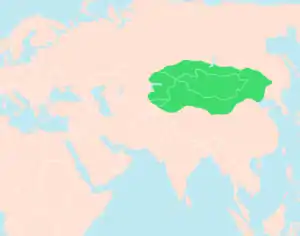Huhanye
Huhanye (Chinese: 呼韓邪), born Jihoushan, a Chanyu of the Xiongnu Empire, the son of Xulüquanqu Chanyu. He rebelled in 59 BC with the aid of Wushanmu and Woyanqudi Chanyu soon committed suicide, leaving the Xiongnu torn apart by factional strife. By 55 BC, only Huhanye and his brother Zhizhi Chanyu were left.
| Jihoushan | |
|---|---|
| Huhanye Chanyu | |
 Domain and influence of the Eastern Huns | |
| Reign | c. 59–31 BC |
| Predecessor | Woyanqudi Chanyu |
| Successor | Fuzhulei Ruodi |
| Dynasty | Modu Chanyu |
| Father | Xulüquanqu Chanyu |
Biography
In 33 BC, Huhanye visited Chang'an as part of the tributary system that existed between the Han and Xiongnu governments. He took the opportunity to request to become an imperial son-in-law and unwilling to honour Huhanye with a real princess, Emperor Yuan ordered that the plainest girl in the harem be selected. A lady-in-waiting named Wang Zhaojun volunteered and the Emperor approved. However, Wang Zhaojun was revealed to be exceedingly beautiful and she was considered one of the Four Beauties of China, alongside Xi Shi, Diaochan, and Yang Guifei.
Wang Zhaojun became a favorite of Huhanye Chanyu, giving birth to two sons. Only one, Yituzhiyashi (伊屠智牙師) has been recorded as survived, and Yituzhiyazhi was involved in politics. They also had two daughters, Yun (雲) known as Subu Juci (须卜居次) and Dangyu Juci(当于居次). Yun was created Princess Yimuo and would later become a powerful figure in Xiongnu politics.
Huhanye was defeated by Zhizhi in 51 BC and fled to the Han dynasty. Zhizhi also submitted to the Han the following year but declared independence in 48 BC once he saw that they favored his brother. Zhizhi moved further west to attack Fergana and the Wusun. In 43 BC, Huhanye moved back north. Zhizhi was killed by the Han at the Battle of Zhizhi in 36 BC, leaving Huhanye the uncontested leader of the Xiongnu. Huhanye died in 31 BC and was succeeded by his son Diaotaomogao.[1][2]
Footnotes
- Whiting 2002, p. 177-178.
- Barfield 1989, p. 74.
References
- Barfield, Thomas (1989), The Perilous Frontier: Nomadic Empires and China, Basil Blackwell
- Bichurin N.Ya., "Collection of information on peoples in Central Asia in ancient times", vol. 1, Sankt Petersburg, 1851, reprint Moscow-Leningrad, 1950
- Chang, Chun-shu (2007), The Rise of the Chinese Empire 1, The University of Michigan Press
- Cosmo, Nicola Di (2002), Ancient China and Its Enemies, Cambridge University Press
- Cosmo, Nicola di (2009), Military Culture in Imperial China, Harvard University Press
- Loewe, Michael (2000), A Biographical Dictionary of the Qin, Former Han, and Xin Periods, Brill
- Taskin B.S., "Materials on Sünnu history", Science, Moscow, 1968, p. 31 (In Russian)
- Whiting, Marvin C. (2002), Imperial Chinese Military History, Writers Club Press
| Preceded by Woyanqudi |
Chanyu of the Xiongnu Empire 59–31 BC |
Succeeded by Fuzhulei Ruodi |